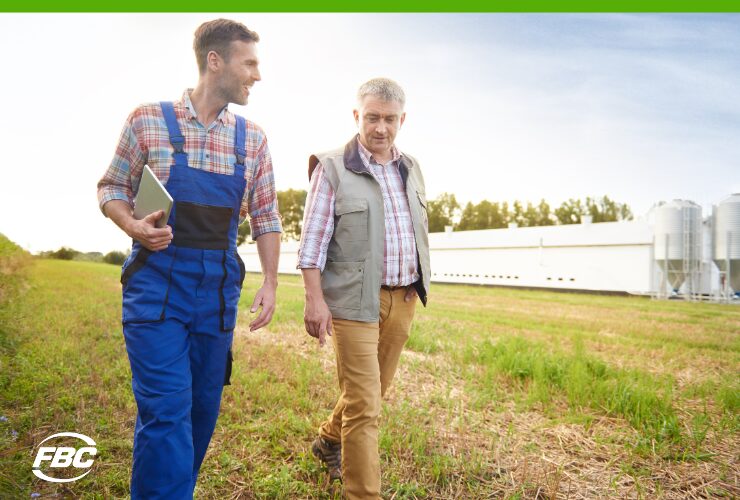Contents
Last updated: Nov. 27, 2024
Understanding Capital Gains Exemption for Farm Property
When the time comes to sell the family farm, understanding capital gains taxes and exemptions can help you ensure you and the next generation will thrive.
Calculating Your Farm’s Capital Gain or Loss
As you may know, a capital gain or loss is triggered whenever property ownership changes. Selling or transitioning your farm property for more than you paid generates a capital gain while selling it for less results in a loss.
To calculate capital gains or losses, you need three figures:
- Proceeds of Disposition (POD): The amount made from the sale or, in cases of a gift or transfer, the property’s fair market value (FMV).
- Adjusted Cost Base (ACB): The amount you originally paid for the property or the FMV used when the property was transferred to you.
- Outlays and Expenses: Any costs incurred to sell your property, like realtor commission, lawyer fees, etc.
To calculate a basic capital gain or loss, use this formula:
Proceeds of Disposition – (Adjusted Cost Base + Outlays & Expenses) = Capital Gain (or Loss)
Understanding the Capital Gains Inclusion Rate
Only a percentage of your capital gain is taxable income (capital gain × the inclusion rate). As of June 2024, the capital gain inclusion rates are as follows:
- Individuals: The inclusion rate is 50% up to $250,000 and 66.67% on any amount above that.
- Corporations & Trusts: The basic inclusion rate is 66.67%.
There are certain circumstances in which your qualified farm property is exempt from capital gains if you sell or transfer.
What is the Lifetime Capital Gains Exemption?
In Canada, the Lifetime Capital Gains Exemption (LCGE) prevents a farmer from paying taxes on a percentage of capital gains from the sale of qualified farm and fishing property (QFFP) – whether or not the farm is incorporated.
To be eligible for the recently increased $1.25 million exemption, the following criteria must be met:
- The property must be qualified farm property.
- The seller must be a Canadian resident.
- The seller, spouse, or common-law partner must meet specific ownership and property use conditions.
What is Considered a Qualified Farm Property?
Qualified farm properties that are eligible for the capital gains exemption fall into one of these categories:
- Real property used in the business of farming, such as land, buildings, and other immovable assets, is owned by you, your spouse, or your common-law partner.
- Share of the capital stock (assets, property, financial resources) of a family farm you, your spouse, or your common-law partner own.
- Interest in a family farm that you, your spouse, or your common-law partner own.
- Class 14.1 depreciable property, such as milk or egg quotas, is used in the normal operation of a farming business in Canada.
Tax Implications and Lifetime Capital Gains Exemption Rules
If you plan to use the LCGE, it’s essential to understand the implications fully, as it may impact your taxable income and government benefits. For example, claiming the LCGE can increase your net income, triggering a full or partial Old Age Security (OAS) clawback.
Also, you cannot simply add your spouse or common-law partner’s name to the title right before you sell the property to double up on the exemption. Transferring land (in full or in part) to a spouse does not bestow the LCGE on the spouse, and the Canada Revenue Agency (CRA) views this as an avoidance and, therefore, subject to anti-avoidance legislation.
Farmers also need to consider how the recent increases in the capital gain inclusion rate will affect the taxable portion of their capital gain.
Taxable Capital Gains and Different Property Types
As mentioned above, some capital gains on a farm sale are taxable, and some are exempt.
Remember, the tax rules are pretty complicated and change frequently, so working with a tax specialist who understands the intricacies of Canadian farm taxes will help ensure you don’t pay more capital gains than you should.
Disposing of Farmland That Includes Your Principal Residence
- If your home was your principal residence for each year you owned it, you generally don’t pay tax on any capital gains when you dispose of it.
- If you sold farmland that included your primary residence, only the gain on the nonresidence land is taxable.
- If your home wasn’t your principal residence for each year you owned it, there may be a taxable capital gain.
Intergenerational Farm Property Transfers
Intergenerational farm property transfers (also called rollovers) are governed by Subsections 73(3) and 73(3.1) of the Income Tax Act.
Suppose you qualify to use an intergenerational farm rollover. In that case, you can transfer your qualified farm property (QFP) to your child while postponing paying tax on any taxable capital gain and any recapture of capital cost allowance until the child sells the property in future.
However, the transfer must meet these conditions:
- The transfer must be to a direct descendant, either down to a child or up to your parents – not a corporation.
- Your child or parents must be a resident of Canada immediately before the transfer.
- The qualified farm property is in Canada and is used as a farming business. Before the transfer, you, your spouse, your common-law partner, or any of your children (or parents) were actively engaged in the business on a regular and ongoing basis.
- The farm cannot be sold by the child (or the person to whom the property was transferred) within three years, or both the owner and the child will face capital gains.
When it comes to intergenerational farm rollovers, the value can be set at any amount between the Adjusted Cost Base (ACB), or the purchase price of the land or the value at which you inherited it, and the Fair Market Value (FMV) of what the property would be worth today, in an open market as part of an arm’s length sale.
As the transfer can happen at any value between ACB and FMV, it is up to the transferor (the farmer) to determine what level of tax (if any) they wish to pay on a transaction. It’s also important to understand that when intergenerational farm rollovers are used, the tax on the land transfer is not immediate but deferred to a later date.
Example – Bill Uses Intergenerational Farm Rollover
Bill has decided it’s time for his son, Pat, to take over operations of the family farm. He has decided to use the intergenerational farm rollover to execute the property transfer. Here are the figures Bill needs to factor in when setting value:
-
- Purchase Price of Land / ACB / Inherited Value: $25,000
- FMV: $225,000
If Bill transfers the farm at FMV, then he would have a capital gain of $200,000 and a taxable capital gain of $200,000 generating an estimated tax of $47,500. If Bill transfers the farm at the ACB, or whatever the value was when he took over operations, there is no capital gain and no tax payable.
If Bill sets a sale price that equals the cost of the property plus his available capital gains deduction and any capital loss balances, he could transfer his farm property to Tim without triggering any additional income tax. This strategy is often referred to as a “tax-deferred transfer.”
However, if his son, Tim, sold the land for FMV they would both have the taxable capital gain.
When setting a value, parents should also consider their child’s future tax situation. The lower the price they pay, the higher their capital gain may be in future.
There are also a few pitfalls to watch out for that can negate your capital gains exemption on an intergenerational farm rollover. For example, suppose your farm is being leased to tenants, or you’re involved in a sharecropping arrangement. The farm property may be considered rental income, not farming income, and therefore, will fail to meet the conditions listed above.
Everyone’s farm situation is unique, and no one tax plan or strategy works across the board. Again, a tax expert is your best bet for finding a solution for your farm.
RELATED: Are You Negating Your Farm’s Capital Gains Exemption?
Thanks to Bill C-208 and subsequent amendments in Budget 2023, farmers who own a Qualified Family Farm Corporation (QFFC) have another option: intergenerational share transfer. In this case, the capital stock of a family farm or the fishing corporation is sold at FMV to a corporation owned by the transferor’s children, grandchildren, stepchildren, children-in-law, nieces and nephews, and grandnieces and grandnephews.
The person who transfers the shares must also provide the CRA with a:
- An independent assessment report of the FMV of the transferred shares.
- An affidavit signed by the individual and a commissioner of oaths or notary public attesting to the disposal of the shares.
While this option involves more paperwork and obtaining a proper property valuation, it opens up more possibilities for transferring the farm to the next generation, including how long the transfer will take.
Bill C-59 recently brought changes to the Intergenerational Business Transfer (IBT) tax rules, allowing two options for business share transfers:
- Immediate IBT:
- Parents immediately and permanently transfer both legal and factual/effective control.
- Immediate transfer of majority of voting shares.
- Parents must not own shares other than non-voting preferred shares within 36 months (3 years) after the disposition.
- Parents transfer management of the business within 36 months after the disposition.
- Gradual IBT:
- Parents immediately and permanently transfer only legal control.
- Immediate transfer of majority of voting shares.
- Parents must not own shares other than non-voting preferred shares within 36 months (3 years) after the disposition.
- Parents transfer management of the business within 60 months (5 years) after the disposition.
- Within 10 years after the disposition, the fair market value of all debt and equity previously owned by the parents is reduced below 30% or 50% of their original amount, depending on whether the shares disposed of were Qualified Small Business Corporation (QSBC) shares or Qualified Family Farm Corporation (QFFC) shares.
Each transfer type has pros and cons, and what may be a pro for one family may be a con for another. The best transfer strategy for you and your farm entirely depends on your unique family situation and goals.
Sale of Capital Property Purchased Before 1972
Capital gains on the sale of property weren’t taxed before 1972. If your qualified farm property was purchased before then, the sale will be subject to special rules, and you will need to complete T1105 Supplementary Schedule for Dispositions of Capital Property Acquired Before 1972.
Incorporated Farming Businesses
If your family farming business is incorporated, the Lifetime Capital Gains Exemption may be available on the sale of a share of your corporation if certain conditions are met:
- The incorporated farm is a Canadian-controlled private corporation.
- At the time of sale, a share of the capital stock was owned by you, your spouse, your common-law partner, or a partnership of which you were a member.
- In the 24 months (2 years) immediately before the sale, more than 50% of the FMV of the corporation’s assets were used for active business carried out primarily in Canada.
- In the 24 months (2 years) immediately before the sale, no one owned the share other than you, a person related to you, or a partnership of which you were a member.
- At the time of the sale, 90% or more of the FMV of the assets of the corporation are used in generating active income for the corporation (investments and rental income are passive income not active income).
It’s important to strike a balance for everyone involved, so you should also seek expert tax advice before making big decisions – especially if you plan to claim your LCGE given the recent inclusion rate changes.
Ultimate Guide to Tax Planning and Preparation for Canadian Farmers [Free Download]
Strategic tax planning and preparation are crucial to maximizing tax savings and building wealth for the future.
Download Ultimate Guide to Tax Planning and Preparation for Canadian Farmers, Contractors, and Small Business Owners to learn how to implement best practices and take advantage of tax tips so you can reduce costs today and lower your future tax obligation.
About Us
For over 70 years, we have helped hard-working Canadian farmers and agricultural producers save time and money by connecting them to a people-powered network of tax, bookkeeping, payroll and financial planning experts.
We deliver industry-specific support for your farm, helping you maximize your tax savings, simplify your books, and manage your payroll.
Our paralegal team can incorporate your farm and file your minute books and annual returns. Our financial and estate planning team can help you manage your wealth and plan your transition to retirement.
Leave your unique tax situation to us. We’ll get you every dollar you deserve. Please book online or call us at 1-800-265-1002.






